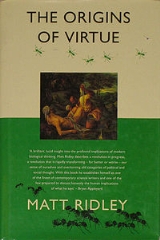
The Origins Of Virtue
Encyclopedia
The Origins of Virtue is a 1996 popular science
book
by Matt Ridley
. In the book, Ridley explores the issues surrounding the development of human
morality
. The book, written from a sociobiological
viewpoint, explores how genetics
can be used to explain certain traits of human behaviour, in particular morality and altruism
.
Starting from the premise that society can on a simplistic level be represented as a variant of the Prisoner's dilemma
, Ridley examines how it has been possible for a society to arise in which people choose to co-operate rather than defect.
Ridley examines the history of different attempts which have been made to explain the fact that humans in society do not defect, looking at various computer generated models which have been used to explain how such behaviour could arise. In particular he looks at systems based on the idea of Tit-for-Tat, where members of the group only cooperate with those who also cooperate and exclude those who do not. This allows altruistic behaviour to develop, and causes the optimum solution to the dilemma, to no longer be to defect but instead to cooperate. He applies this to humans and suggests that genes which generated altruistic-tit for tat behaviour would be likely to be passed on and therefore give rise to the kind of behaviour we see today.
From this argument Ridley argues that society operates best in groups of around 150 individuals, which he suggests is the level at which humans are capable of being sure about which members to cooperate with and which to exclude. Although he avoids drawing any specific political points, Ridley ends his book by arguing for a smaller state operating on a more local level.
Popular science
Popular science, sometimes called literature of science, is interpretation of science intended for a general audience. While science journalism focuses on recent scientific developments, popular science is broad-ranging, often written by scientists as well as journalists, and is presented in many...
book
Book
A book is a set or collection of written, printed, illustrated, or blank sheets, made of hot lava, paper, parchment, or other materials, usually fastened together to hinge at one side. A single sheet within a book is called a leaf or leaflet, and each side of a leaf is called a page...
by Matt Ridley
Matt Ridley
Matthew White Ridley, FRSL, FMedSci is an English journalist, writer, biologist, and businessman.-Career:...
. In the book, Ridley explores the issues surrounding the development of human
Human
Humans are the only living species in the Homo genus...
morality
Morality
Morality is the differentiation among intentions, decisions, and actions between those that are good and bad . A moral code is a system of morality and a moral is any one practice or teaching within a moral code...
. The book, written from a sociobiological
Sociobiology
Sociobiology is a field of scientific study which is based on the assumption that social behavior has resulted from evolution and attempts to explain and examine social behavior within that context. Often considered a branch of biology and sociology, it also draws from ethology, anthropology,...
viewpoint, explores how genetics
Genetics
Genetics , a discipline of biology, is the science of genes, heredity, and variation in living organisms....
can be used to explain certain traits of human behaviour, in particular morality and altruism
Altruism
Altruism is a concern for the welfare of others. It is a traditional virtue in many cultures, and a core aspect of various religious traditions, though the concept of 'others' toward whom concern should be directed can vary among cultures and religions. Altruism is the opposite of...
.
Starting from the premise that society can on a simplistic level be represented as a variant of the Prisoner's dilemma
Prisoner's dilemma
The prisoner’s dilemma is a canonical example of a game, analyzed in game theory that shows why two individuals might not cooperate, even if it appears that it is in their best interest to do so. It was originally framed by Merrill Flood and Melvin Dresher working at RAND in 1950. Albert W...
, Ridley examines how it has been possible for a society to arise in which people choose to co-operate rather than defect.
Ridley examines the history of different attempts which have been made to explain the fact that humans in society do not defect, looking at various computer generated models which have been used to explain how such behaviour could arise. In particular he looks at systems based on the idea of Tit-for-Tat, where members of the group only cooperate with those who also cooperate and exclude those who do not. This allows altruistic behaviour to develop, and causes the optimum solution to the dilemma, to no longer be to defect but instead to cooperate. He applies this to humans and suggests that genes which generated altruistic-tit for tat behaviour would be likely to be passed on and therefore give rise to the kind of behaviour we see today.
From this argument Ridley argues that society operates best in groups of around 150 individuals, which he suggests is the level at which humans are capable of being sure about which members to cooperate with and which to exclude. Although he avoids drawing any specific political points, Ridley ends his book by arguing for a smaller state operating on a more local level.

